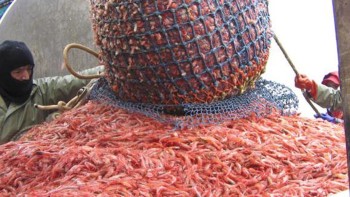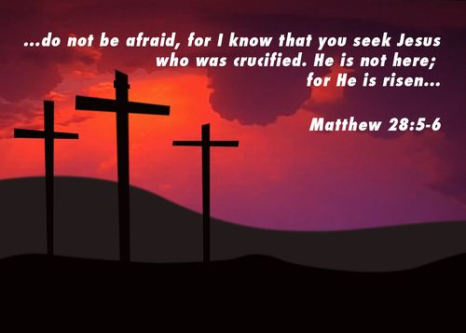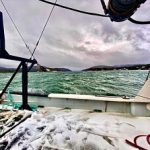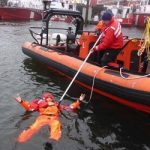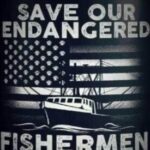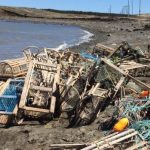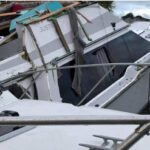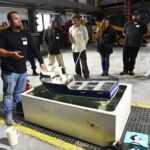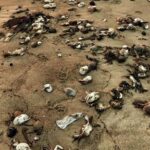Monthly Archives: March 2016
Cooking Carlos in Canada while Boris Worm wants surveillance for all!
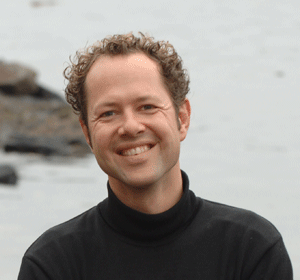 Carlos Rafael posted a $1-million bond earlier this month to get out of jail and now he’s back in the fish business. Rafael’s a New England seafood legend whose life story reads like a movie script. His cautionary tale also helps explain why Dalhousie University scientist Boris Worm wants fishing vessels to be tracked more closely. But I’ll get back to that later. Rafael, born 63 years ago in Portugal’s Azorean Islands, is a legend in the New England fishing industry. He owns more than 40 vessels and has been described in U.S. media reports as a “pillar” of the seafood industry in New Bedford, Mass. Rafael’s defence team says he’s a good guy. He helped his mom and dad fix their home on the island of Corvo. He hosts an annual island fundraising meal for orphans — and for widows too, I’m sure. Read the rest here 13:30
Carlos Rafael posted a $1-million bond earlier this month to get out of jail and now he’s back in the fish business. Rafael’s a New England seafood legend whose life story reads like a movie script. His cautionary tale also helps explain why Dalhousie University scientist Boris Worm wants fishing vessels to be tracked more closely. But I’ll get back to that later. Rafael, born 63 years ago in Portugal’s Azorean Islands, is a legend in the New England fishing industry. He owns more than 40 vessels and has been described in U.S. media reports as a “pillar” of the seafood industry in New Bedford, Mass. Rafael’s defence team says he’s a good guy. He helped his mom and dad fix their home on the island of Corvo. He hosts an annual island fundraising meal for orphans — and for widows too, I’m sure. Read the rest here 13:30
Silver Bay Seafoods in American Samoa to recruit for their Summer Seafood Processing
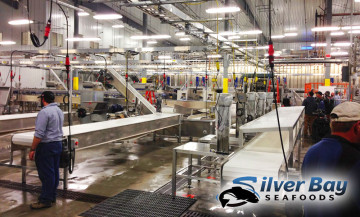 About 200 job seekers turned up at the Tradewinds Saturday to learn about job opportunities offered by Silver Bay Seafoods in Alaska, an integrated processor of frozen salmon for domestic and export markets. Two company reps are in the territory to recruit for their Summer Seafood Processing. Most of those who turned up were young people, several of whom are currently working at the canneries. Silver Bay Seafoods is looking for manpower from anywhere it can and has extended job offers to non-US states and foreign countries using special immigration provisions. Link 11:19
About 200 job seekers turned up at the Tradewinds Saturday to learn about job opportunities offered by Silver Bay Seafoods in Alaska, an integrated processor of frozen salmon for domestic and export markets. Two company reps are in the territory to recruit for their Summer Seafood Processing. Most of those who turned up were young people, several of whom are currently working at the canneries. Silver Bay Seafoods is looking for manpower from anywhere it can and has extended job offers to non-US states and foreign countries using special immigration provisions. Link 11:19
United Nations negotiations begin today in New York to rescue ocean life
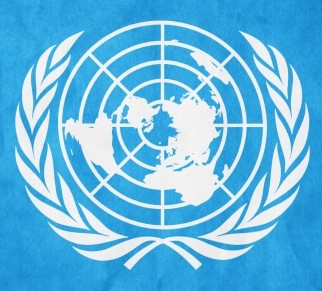 It took a decade to get to the negotiating table, and it could easily take another to finish the job, but UN talks in New York to safeguard life in the high seas finally begin in earnest Monday. The stakes could hardly be higher, experts and diplomats agree. Oceans produce half the oxygen we breathe, regulate the weather, and provide humanity’s single largest source of protein. Without them, Earth would be just another barren rock in the Universe. And yet humanity has harvested marine species upon which we depend to the edge of extinction, and used the seas as a collective garbage dump. Climate change, meanwhile, has altered the ocean’s basic chemistry in ways that raise the specter of a mass extinction that scientists say is already underway. Read the rest here 10:24
It took a decade to get to the negotiating table, and it could easily take another to finish the job, but UN talks in New York to safeguard life in the high seas finally begin in earnest Monday. The stakes could hardly be higher, experts and diplomats agree. Oceans produce half the oxygen we breathe, regulate the weather, and provide humanity’s single largest source of protein. Without them, Earth would be just another barren rock in the Universe. And yet humanity has harvested marine species upon which we depend to the edge of extinction, and used the seas as a collective garbage dump. Climate change, meanwhile, has altered the ocean’s basic chemistry in ways that raise the specter of a mass extinction that scientists say is already underway. Read the rest here 10:24
Fishermen hold Science hostage, demand $45,000 in ransom claim the Feds
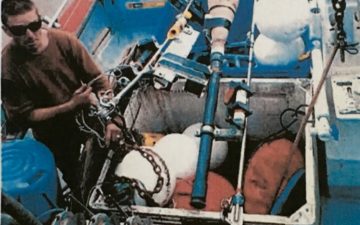 Two fishermen who found a piece of scientific equipment off the coast of Monterey are holding it hostage, interfering with international research, and demanding $45,000 ransom for its return, the federal government claims in court. The United States sued Daniel Sherer, Patrick Anderson and their business, A&S Fisheries, in Federal Court on Friday, accusing them of holding government property “de facto hostage” and causing irreparable harm to an international research project. The “oceanographic mooring buoy,” known as Scientific Mooring MS1, was one of several anchored to the seafloor to record data on the velocity, temperature, salinity and sediment concentration of ocean currents. Read the rest here 08:00
Two fishermen who found a piece of scientific equipment off the coast of Monterey are holding it hostage, interfering with international research, and demanding $45,000 ransom for its return, the federal government claims in court. The United States sued Daniel Sherer, Patrick Anderson and their business, A&S Fisheries, in Federal Court on Friday, accusing them of holding government property “de facto hostage” and causing irreparable harm to an international research project. The “oceanographic mooring buoy,” known as Scientific Mooring MS1, was one of several anchored to the seafloor to record data on the velocity, temperature, salinity and sediment concentration of ocean currents. Read the rest here 08:00
California bans commercial crab fishing due to excessive radiation in seafood? Really?
 In November of last year, California state officials placed an indefinite hold on the commercial crab season, in order to protect public health. The reason given by the state was dangerously high levels of algal toxins in the bodies of the crabs. But according to New York radio station 95.1 FM (SuperStation 95), insiders from the California Fish and Game Commission have revealed that the real reason for the ban was dangerously high levels of radioactivity resulting from the 2011 Fukushima nuclear disaster. I’ve heard it all now! Read the rest here 12:10
In November of last year, California state officials placed an indefinite hold on the commercial crab season, in order to protect public health. The reason given by the state was dangerously high levels of algal toxins in the bodies of the crabs. But according to New York radio station 95.1 FM (SuperStation 95), insiders from the California Fish and Game Commission have revealed that the real reason for the ban was dangerously high levels of radioactivity resulting from the 2011 Fukushima nuclear disaster. I’ve heard it all now! Read the rest here 12:10
Environmental Defense Fund — Monitoring isn’t the fisherman’s enemy
 The port of New Bedford has been rocked by allegations of widespread and longstanding corruption by one of the industry’s biggest players. It is understandable that shocked fishermen, regulators, and community leaders are casting around for causes and solutions. Some have contorted the facts to fit their arguments against sector management. The truth, however, is that this alleged criminal misconduct started decades before the transition to sectors, and exploited a far older management flaw: the lack of sufficient monitoring in the fishery. It is a key reason why the fishery continues to be in crisis and in the headlines; and in the wake of this latest scandal it must be urgently addressed. Read the rest here 09:49
The port of New Bedford has been rocked by allegations of widespread and longstanding corruption by one of the industry’s biggest players. It is understandable that shocked fishermen, regulators, and community leaders are casting around for causes and solutions. Some have contorted the facts to fit their arguments against sector management. The truth, however, is that this alleged criminal misconduct started decades before the transition to sectors, and exploited a far older management flaw: the lack of sufficient monitoring in the fishery. It is a key reason why the fishery continues to be in crisis and in the headlines; and in the wake of this latest scandal it must be urgently addressed. Read the rest here 09:49
The Cover Up Of The Texas American Eel – Part Two by Jason Fregia
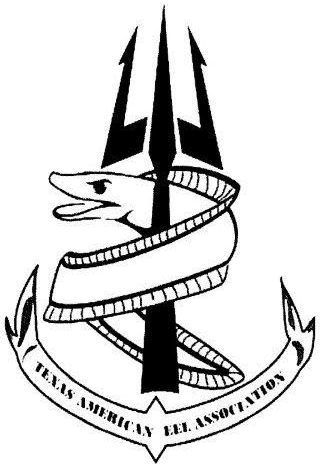 Early this year I started a petition to have the Texas American Eel put on the Commercial Fishing list here in Texas after Texas and Parks and Wildlife would not allow me to Petition the for a rule change.allow me to Petition the Texas Parks and Wildlife Commission for a rule change. They actually denied me before even filing the Petition with the commission when I was asking how, so I could file. The Petition Clause protects the Right to Petition all branches and agencies of Government for action. They consider my asking how as my actual petition which was clearly a violation of my civil rights, The First Amendment to the United States Constitution states. Read the rest here 21:46
Early this year I started a petition to have the Texas American Eel put on the Commercial Fishing list here in Texas after Texas and Parks and Wildlife would not allow me to Petition the for a rule change.allow me to Petition the Texas Parks and Wildlife Commission for a rule change. They actually denied me before even filing the Petition with the commission when I was asking how, so I could file. The Petition Clause protects the Right to Petition all branches and agencies of Government for action. They consider my asking how as my actual petition which was clearly a violation of my civil rights, The First Amendment to the United States Constitution states. Read the rest here 21:46
Bristol Bay fishermen prepare for quality mandates
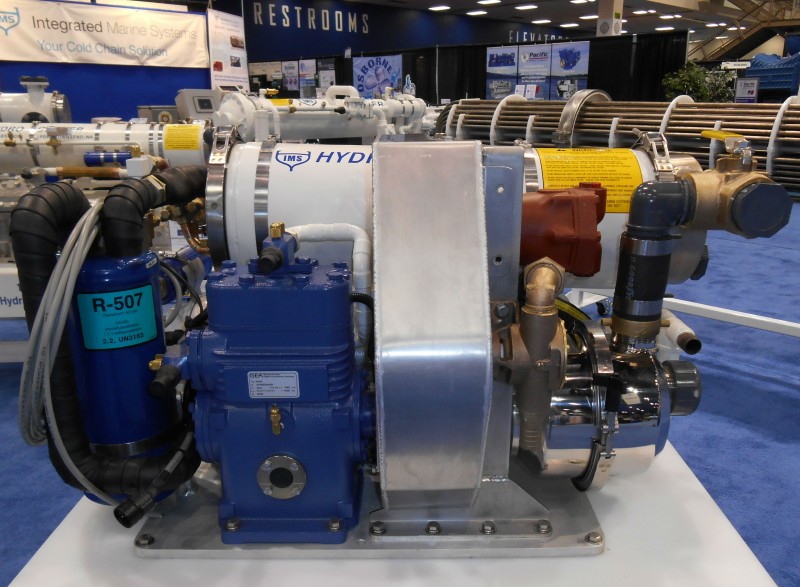 The coming mandate for higher quality fish deliveries in Bristol Bay could be particularly difficult for watershed residents, but some have said it could also be good news in the long term. At least one Bristol Bay processor, Icicle Seafoods, has told fishermen that they’ll stop buying dry fish in a few years after phasing in quality requirements, and more are expected to follow. Right now, the decision to ice or not is left to individual fishermen. Incentives help encourage chilling fish, but an individual can try to catch more fish to make up the price difference, and different fishermen make different choices. A quality mandate by even one processor will shift that, although fishermen may still have a range of options, from icing with slush bags or insulated holds, Read the rest here 12:33
The coming mandate for higher quality fish deliveries in Bristol Bay could be particularly difficult for watershed residents, but some have said it could also be good news in the long term. At least one Bristol Bay processor, Icicle Seafoods, has told fishermen that they’ll stop buying dry fish in a few years after phasing in quality requirements, and more are expected to follow. Right now, the decision to ice or not is left to individual fishermen. Incentives help encourage chilling fish, but an individual can try to catch more fish to make up the price difference, and different fishermen make different choices. A quality mandate by even one processor will shift that, although fishermen may still have a range of options, from icing with slush bags or insulated holds, Read the rest here 12:33
Report suggests snow crab in decline
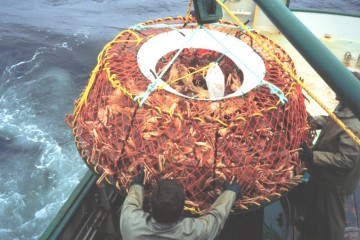 Jamie Rose hopes the numbers are as wrong as he thinks they are. That was the St. Anthony fisherman’s reaction to a snow crab report that was recently released by the Canadian Science Advisory Secretariat. The annual report examined fishing areas 2HJ3KLNOP4R and it paints a bleak future for the upcoming season. The index-based report suggests exploitable biomass – large male crab – has declined to its lowest observed level in the last two decades of study, dropping from a highpoint of nearly 70 in the mid-‘90s to a all time low of around 10. Recruitment appears to have bottomed out. The index level is sitting around three points, which dropped from around 15 over the last five years. Read the rest here 11:26
Jamie Rose hopes the numbers are as wrong as he thinks they are. That was the St. Anthony fisherman’s reaction to a snow crab report that was recently released by the Canadian Science Advisory Secretariat. The annual report examined fishing areas 2HJ3KLNOP4R and it paints a bleak future for the upcoming season. The index-based report suggests exploitable biomass – large male crab – has declined to its lowest observed level in the last two decades of study, dropping from a highpoint of nearly 70 in the mid-‘90s to a all time low of around 10. Recruitment appears to have bottomed out. The index level is sitting around three points, which dropped from around 15 over the last five years. Read the rest here 11:26
Price, and not crab, on the table: Buyers, commercial fishermen discussing rates
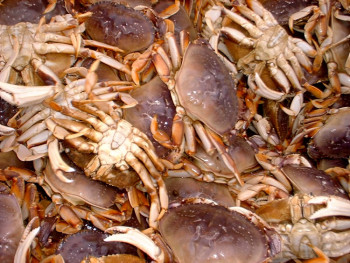 Crab pots were set off the coast of Pillar Point Harbor near Half Moon Bay Friday and will be offered to buyers seeking to determine how much meat the crustaceans will yield, said Jim Anderson, a crabber and member of the state’s Dungeness Crab Task Force. With forecasts predicting poor ocean conditions for this weekend’s kickoff to an abnormally short season, Anderson said the annual process of determining how meaty the crab are isn’t expected to set fishermen back too far. “On Monday they’ll have an understanding of what the crab looks like and then set the price. Then sometime shortly thereafter we’ll go fishing,” Anderson said. “We always do this to give them some kind of idea of what the value of the crab is. We waited this long, we surely don’t want to go harvest bad crab for the consumer.” Read the article here 08:45
Crab pots were set off the coast of Pillar Point Harbor near Half Moon Bay Friday and will be offered to buyers seeking to determine how much meat the crustaceans will yield, said Jim Anderson, a crabber and member of the state’s Dungeness Crab Task Force. With forecasts predicting poor ocean conditions for this weekend’s kickoff to an abnormally short season, Anderson said the annual process of determining how meaty the crab are isn’t expected to set fishermen back too far. “On Monday they’ll have an understanding of what the crab looks like and then set the price. Then sometime shortly thereafter we’ll go fishing,” Anderson said. “We always do this to give them some kind of idea of what the value of the crab is. We waited this long, we surely don’t want to go harvest bad crab for the consumer.” Read the article here 08:45
Prosecutors get extension of deadline to indict New Bedford fishing magnate Carlos Rafael
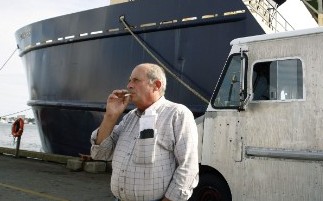 Prosecutors have received an extension of the deadline to indict local fishing magnate Carlos Rafael, a U.S. District Court spokesperson confirmed Friday. The length of the deadline’s extension was not disclosed. Rafael, 63, was arrested Feb. 26 on charges of conspiracy and submitting falsified records to the government, after federal authorities raided the building on New Bedford’s waterfront. He was released March 2 on a $1 million bond, with conditions including a monitoring bracelet and nightly curfew at his Dartmouth home. Read the story here 07:29
Prosecutors have received an extension of the deadline to indict local fishing magnate Carlos Rafael, a U.S. District Court spokesperson confirmed Friday. The length of the deadline’s extension was not disclosed. Rafael, 63, was arrested Feb. 26 on charges of conspiracy and submitting falsified records to the government, after federal authorities raided the building on New Bedford’s waterfront. He was released March 2 on a $1 million bond, with conditions including a monitoring bracelet and nightly curfew at his Dartmouth home. Read the story here 07:29
New manual outlines steps for fishermen, communities to take in crisis
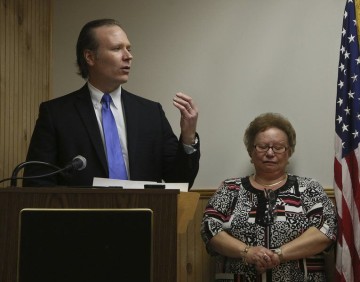 The concept first began to crystallize in Angela Sanfilippo’s mind about four years ago, when the president of the Gloucester Fishermen’s Wives Association realized she needed to start putting some things down on paper. Sanfilippo, both in her roles with fishing-based community groups and her own experience as a wife, daughter and sister of fishermen, had helped develop a series of protocols to help fishermen avoid calamities on the water and help the Gloucester fishing community deal with fishing tragedies when they occur. “I just thought that we should start putting these things in writing because we’re not going to be around forever,” Sanfilippo said. Thus was born the idea that burst into reality yesterday when the Fishing Partnership Support Services unveiled its RESCUES manual in an event at the U.S. Coast Guard’s Station Gloucester. Read the rest here 22:50
The concept first began to crystallize in Angela Sanfilippo’s mind about four years ago, when the president of the Gloucester Fishermen’s Wives Association realized she needed to start putting some things down on paper. Sanfilippo, both in her roles with fishing-based community groups and her own experience as a wife, daughter and sister of fishermen, had helped develop a series of protocols to help fishermen avoid calamities on the water and help the Gloucester fishing community deal with fishing tragedies when they occur. “I just thought that we should start putting these things in writing because we’re not going to be around forever,” Sanfilippo said. Thus was born the idea that burst into reality yesterday when the Fishing Partnership Support Services unveiled its RESCUES manual in an event at the U.S. Coast Guard’s Station Gloucester. Read the rest here 22:50
The Saga continues on ‘Deadliest Catch’ “It’s official: Elliott’s out, Jake’s in!
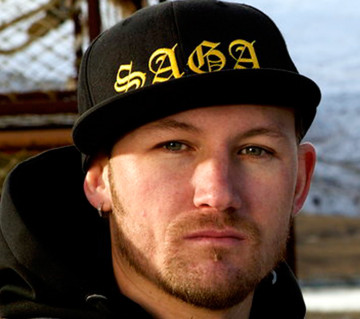 Capt. Elliott Neese is officially off “Deadliest Catch” season 12 and Capt. Jake Anderson will take over the Saga. According to a tweet by Discovery, Neese won’t be on this season. The network wrote on Twitter Thursday: “It’s official: Elliott’s out, Jake’s in: 5 days til #DeadliestCatch”. In an interview Elliott gave recently, he said he wasn’t going to be on “Deadliest Catch” so he could focus on himself after his stint in rehab. Last year he battled serious alcohol and drug problems and it affected his work aboard the F/V Saga. He was seen throwing temper tantrums and taking his frustrations out on the crew. Video, Read the rest here 19:24
Capt. Elliott Neese is officially off “Deadliest Catch” season 12 and Capt. Jake Anderson will take over the Saga. According to a tweet by Discovery, Neese won’t be on this season. The network wrote on Twitter Thursday: “It’s official: Elliott’s out, Jake’s in: 5 days til #DeadliestCatch”. In an interview Elliott gave recently, he said he wasn’t going to be on “Deadliest Catch” so he could focus on himself after his stint in rehab. Last year he battled serious alcohol and drug problems and it affected his work aboard the F/V Saga. He was seen throwing temper tantrums and taking his frustrations out on the crew. Video, Read the rest here 19:24
Nunavut fisheries casting a net for federal infrastructure money
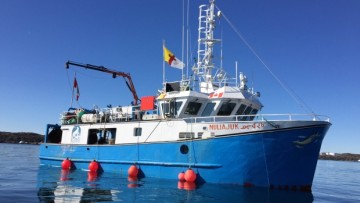 Nunavut fisheries say the Liberal budget is giving them renewed hope for much needed money and infrastructure to stimulate their growing industry. The budget offered some good news and some bad news for the territory’s fisheries including money for development, training and research although Inuit fisheries are still not included in some programs aimed at First Nations fisheries. “Firstly the strengthening of the Northern Economic Development — that’s good news from a Nunavut perspective,” said Jerry Ward, chair of the Nunavut Offshore Allocation Holders Association, which represents Nunavut’s offshore fishing industry. Read the rest here 15:42
Nunavut fisheries say the Liberal budget is giving them renewed hope for much needed money and infrastructure to stimulate their growing industry. The budget offered some good news and some bad news for the territory’s fisheries including money for development, training and research although Inuit fisheries are still not included in some programs aimed at First Nations fisheries. “Firstly the strengthening of the Northern Economic Development — that’s good news from a Nunavut perspective,” said Jerry Ward, chair of the Nunavut Offshore Allocation Holders Association, which represents Nunavut’s offshore fishing industry. Read the rest here 15:42
Environmentalists Wield Powerful Endangered Species Act to Kill Jobs
 Think fish when you read this. From the article: The Center for Biological Diversity (CBD) is a radical environmental legal action group that’s known for frequently suing to block commercial, industrial, and personal activities in an effort to “save the environment,” regardless of who gets hurt. One of the group’s leaders and co-founders, Kieran Suckling, was a well-known activist in the 1980s and has been linked to vandalism and sabotage group Earth First! From its inception, CBD has sought ways to permanently stop natural resource use, and with the help of environmental attorneys, CBD has successfully weaponized the Endangered Species Act (ESA) against ranchers, loggers, miners, (fishermen) and human activity in general. Read the rest here 13:51
Think fish when you read this. From the article: The Center for Biological Diversity (CBD) is a radical environmental legal action group that’s known for frequently suing to block commercial, industrial, and personal activities in an effort to “save the environment,” regardless of who gets hurt. One of the group’s leaders and co-founders, Kieran Suckling, was a well-known activist in the 1980s and has been linked to vandalism and sabotage group Earth First! From its inception, CBD has sought ways to permanently stop natural resource use, and with the help of environmental attorneys, CBD has successfully weaponized the Endangered Species Act (ESA) against ranchers, loggers, miners, (fishermen) and human activity in general. Read the rest here 13:51
BREAKING – Cashes Ledge dropped from National Marine Monument plan
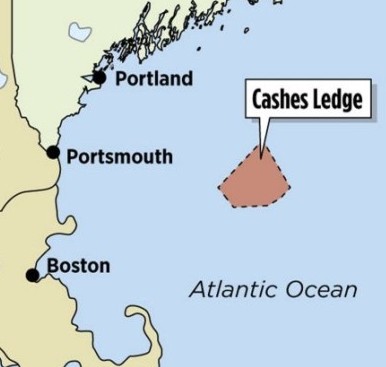 The proposal to place a National Marine Monument around the area of Cashes Ledge about 80 miles off of Cape Ann has been “taken off the table,” members of the White House’s Council on Environmental Quality told fishing stakeholders Thursday at a meeting in Boston. The Obama administration’s decision not to use the Antiquities Act to designate the area of Cashes Ledge as a Marine National Monument is a victory for fishing stakeholders and others who characterized the proposal — pushed largely by environmentalists and conservationists — as an end-run around the existing fisheries management system and wholly unnecessary given the existing protections already afforded the area that currently is closed to commercial fishing. Read the rest here 11:31
The proposal to place a National Marine Monument around the area of Cashes Ledge about 80 miles off of Cape Ann has been “taken off the table,” members of the White House’s Council on Environmental Quality told fishing stakeholders Thursday at a meeting in Boston. The Obama administration’s decision not to use the Antiquities Act to designate the area of Cashes Ledge as a Marine National Monument is a victory for fishing stakeholders and others who characterized the proposal — pushed largely by environmentalists and conservationists — as an end-run around the existing fisheries management system and wholly unnecessary given the existing protections already afforded the area that currently is closed to commercial fishing. Read the rest here 11:31
Halibut season opens; SE fleet already lands 260,000 lbs.
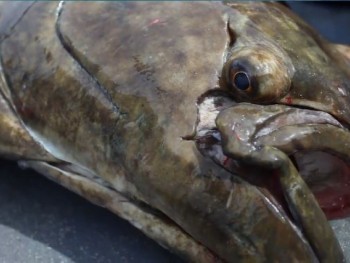 A little more than three days into the 2016 halibut season, Area 2C, Southeast Alaska, has had the fleet hitting it the hardest. Nearly 260,000 pounds had been landed in Southeast, compared to less than 50,000 in Area 3A, Central Gulf of Alaska, and no activity in other areas of the state. The state-wide directed commercial halibut quota is just over 17 million pounds. Prices have started about where they left off last year, with Kodiak reportedly at $6.25 for fish under 20 pounds, $6.50 for fish 20 to 40 pounds, and $6.85 for fish 40 pounds and up. Read the rest here 10:06
A little more than three days into the 2016 halibut season, Area 2C, Southeast Alaska, has had the fleet hitting it the hardest. Nearly 260,000 pounds had been landed in Southeast, compared to less than 50,000 in Area 3A, Central Gulf of Alaska, and no activity in other areas of the state. The state-wide directed commercial halibut quota is just over 17 million pounds. Prices have started about where they left off last year, with Kodiak reportedly at $6.25 for fish under 20 pounds, $6.50 for fish 20 to 40 pounds, and $6.85 for fish 40 pounds and up. Read the rest here 10:06
‘A slap in the face’: Ferry’s inability to haul commercial trucks gets negative reactions
 The announcement of the new high-speed ferry service between Yarmouth and Portland, Maine, now expected to restart in mid-June, is not the cat’s meow to some. No commercial trucks will be allowed on board, said Bay Ferries president and CEO Mark MacDonald at a briefing in Halifax. “It’s disappointing,” said Nathan Blades of Sable Fish Packers of Shelburne, who is also president of the Nova Scotia Fish Packers Association. “That link has traditionally been considered a valuable one for the seafood industry and getting fresh fish to U.S. markets is extremely important to securing that market. It’s a slap in the face to Nova Scotia business.” Read the rest here 09:17
The announcement of the new high-speed ferry service between Yarmouth and Portland, Maine, now expected to restart in mid-June, is not the cat’s meow to some. No commercial trucks will be allowed on board, said Bay Ferries president and CEO Mark MacDonald at a briefing in Halifax. “It’s disappointing,” said Nathan Blades of Sable Fish Packers of Shelburne, who is also president of the Nova Scotia Fish Packers Association. “That link has traditionally been considered a valuable one for the seafood industry and getting fresh fish to U.S. markets is extremely important to securing that market. It’s a slap in the face to Nova Scotia business.” Read the rest here 09:17
Bay Area crab fishermen prepare for Saturday’s long overdue season opener
 The crab pots were piled eight high along the Santa Cruz Small Craft Harbor dock Wednesday afternoon as Dungeness crab fisherman loaded boats in preparation for Saturday’s long overdue commercial crab fishery opener. After a five-month delay due to the presence of domoic acid, a potentially deadly neurotoxin that had been found in crabs, state health officials determined the crabs “no longer pose a significant human health risk.” Some have decided it’s not worth the effort this late in the season. As others loaded crab pots onto boats in the Santa Cruz Harbor, longtime crab fisherman Stan Bruno of Santa Cruz was packing up his gear to store it for the summer. Read the rest here 08:26
The crab pots were piled eight high along the Santa Cruz Small Craft Harbor dock Wednesday afternoon as Dungeness crab fisherman loaded boats in preparation for Saturday’s long overdue commercial crab fishery opener. After a five-month delay due to the presence of domoic acid, a potentially deadly neurotoxin that had been found in crabs, state health officials determined the crabs “no longer pose a significant human health risk.” Some have decided it’s not worth the effort this late in the season. As others loaded crab pots onto boats in the Santa Cruz Harbor, longtime crab fisherman Stan Bruno of Santa Cruz was packing up his gear to store it for the summer. Read the rest here 08:26
Dogfish Neck? Cape Skate? Pollock Peninsula? – Cape fishermen anticipated cod collapse
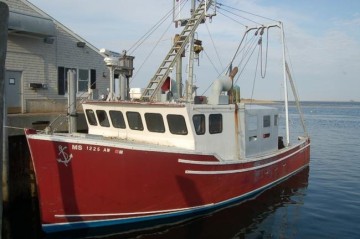 Can this still be Cape Cod without the cod? There still is cod, and they’re still being caught, but the stocks have collapsed and that was further underlined this week when a Georges Bank quota cut of 62 percent to 762 metric tons was proposed by the National Oceanic and Atmospheric Administration’s Fisheries Management Council on Monday. That follows an earlier massive cut during the last three-year management period – totaling a 95-percent reduction over the last four years. Outer Cape fishermen are ahead of the curve – most have already abandoned cod. Read the rest here 07:53
Can this still be Cape Cod without the cod? There still is cod, and they’re still being caught, but the stocks have collapsed and that was further underlined this week when a Georges Bank quota cut of 62 percent to 762 metric tons was proposed by the National Oceanic and Atmospheric Administration’s Fisheries Management Council on Monday. That follows an earlier massive cut during the last three-year management period – totaling a 95-percent reduction over the last four years. Outer Cape fishermen are ahead of the curve – most have already abandoned cod. Read the rest here 07:53
Nova Scotia to enforce mandatory life-jacket rules for fishermen
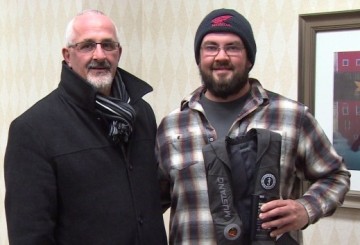 Officials with Nova Scotia’s Labour Department will be hitting wharves and docks in 2016 to remind commercial fishermen that wearing a life-jacket at sea is the law in this province. “We are going to be seeing what the compliance level is and offering advice as to what they should wear, showing them the products that are out for personal floatation devices and let them know about our regulations,” said Tom LeBlanc, the department’s northern regional director. The campaign will start on the Northumberland Strait and western Cape Breton. Read the rest here 19:53
Officials with Nova Scotia’s Labour Department will be hitting wharves and docks in 2016 to remind commercial fishermen that wearing a life-jacket at sea is the law in this province. “We are going to be seeing what the compliance level is and offering advice as to what they should wear, showing them the products that are out for personal floatation devices and let them know about our regulations,” said Tom LeBlanc, the department’s northern regional director. The campaign will start on the Northumberland Strait and western Cape Breton. Read the rest here 19:53
Crab fishing – handling and releasing wolffish
Crab fishermen! Wolffish are at risk. You can contribute to their recovery. If you catch some by accident, handle them carefully and release them as quickly as possible. 17:43
Victoria Co. snow crab fishermen could be hit hardest by quota cuts
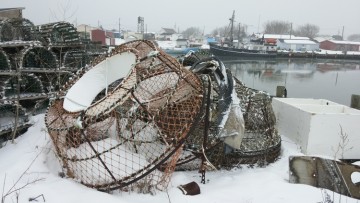 Snow crab fishermen in the waters off Cape Breton are preparing for a leaner season this year, with quota cuts approved or proposed in both the Gulf of St. Lawrence and the Atlantic Ocean. While most fishermen know the fishery is cyclical and they need to take fewer crab when the stock is low, those in Crab Fishing Areas 20 to 22 – which covers the Atlantic side of the island, along the Cabot Trail from Glace Bay to Bay St. Lawrence – are facing a steep cut that could be as high as 45 per cent. What’s more, the subsea cable for the Maritime Link,, Read the article here 17:14
Snow crab fishermen in the waters off Cape Breton are preparing for a leaner season this year, with quota cuts approved or proposed in both the Gulf of St. Lawrence and the Atlantic Ocean. While most fishermen know the fishery is cyclical and they need to take fewer crab when the stock is low, those in Crab Fishing Areas 20 to 22 – which covers the Atlantic side of the island, along the Cabot Trail from Glace Bay to Bay St. Lawrence – are facing a steep cut that could be as high as 45 per cent. What’s more, the subsea cable for the Maritime Link,, Read the article here 17:14
That Sinking Feeling – The effort to keep Humboldt Bay’s derelict boats from going under
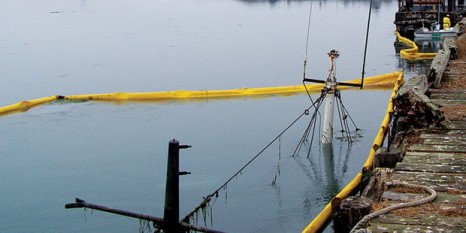 The sinking of the Dennis Gayle is a success story, perhaps not to boatmakers or historians, but to the people and creatures that call Humboldt Bay home. On the morning of Feb. 28, someone at the Humboldt Bay Forest Products Dock in Fields Landing noticed the Dennis Gayle, which had been moored there for years, was gone. The wood-hulled ship, a repurposed Naval vessel that was once the last boat to whale out of Humboldt Bay before the practice was banned in the 1970s, was lying at the bottom of the bay. No one yet knows exactly why it sank — a sprung plank in the hull is everyone’s best guess — but it didn’t surprise anyone. The Dennis Gayle had been ready to go underwater for years. Read the rest here 15:17
The sinking of the Dennis Gayle is a success story, perhaps not to boatmakers or historians, but to the people and creatures that call Humboldt Bay home. On the morning of Feb. 28, someone at the Humboldt Bay Forest Products Dock in Fields Landing noticed the Dennis Gayle, which had been moored there for years, was gone. The wood-hulled ship, a repurposed Naval vessel that was once the last boat to whale out of Humboldt Bay before the practice was banned in the 1970s, was lying at the bottom of the bay. No one yet knows exactly why it sank — a sprung plank in the hull is everyone’s best guess — but it didn’t surprise anyone. The Dennis Gayle had been ready to go underwater for years. Read the rest here 15:17
An assortment of today’s offshore energy article’s, titles, and links – Are you losing your grounds?
 New York – A Commitment To Wind Energy – Click here Martha’s Vineyard – DONG Energy meets and greets Islanders – Click here New Jersey – Fishermen’s Energy Ocean Wind Project Tries Again for Governor’s Approval – Click here New York – Interior Department designates area 11 miles off Long Beach coast – Click here California – US Considers 800-MW Floating Wind Farm in California – Click here Bay of Fundy – Fundy tidal energy study to look at seabirds, lobster, acoustic environment – Click here Yarmouth, N.S. – Developers of proposed wind power project off Yarmouth will consult with fisheries, others, company says – Click here 14:51
New York – A Commitment To Wind Energy – Click here Martha’s Vineyard – DONG Energy meets and greets Islanders – Click here New Jersey – Fishermen’s Energy Ocean Wind Project Tries Again for Governor’s Approval – Click here New York – Interior Department designates area 11 miles off Long Beach coast – Click here California – US Considers 800-MW Floating Wind Farm in California – Click here Bay of Fundy – Fundy tidal energy study to look at seabirds, lobster, acoustic environment – Click here Yarmouth, N.S. – Developers of proposed wind power project off Yarmouth will consult with fisheries, others, company says – Click here 14:51
New Quota Closes Norton Sound Commercial Crab Fishery
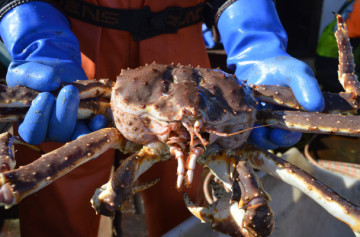 Norton Sound’s commercial crab fishery closed Thursday. In the first season shortened by a new quota, winter fishermen harvested the allowed 41,376 pounds of red king crab in just over a month. Jim Menard is the area manager for the Alaska Department of Fish and Game. He said the Board of Fisheries imposed the new quota to better balance the winter and summer crab catches. The quota shrunk the winter season by several months and cut the harvest by more than half, compared to last year’s record-breaking haul. Still, Menard said commercial crabbers have had a lucrative winter. Read the rest here 13:57
Norton Sound’s commercial crab fishery closed Thursday. In the first season shortened by a new quota, winter fishermen harvested the allowed 41,376 pounds of red king crab in just over a month. Jim Menard is the area manager for the Alaska Department of Fish and Game. He said the Board of Fisheries imposed the new quota to better balance the winter and summer crab catches. The quota shrunk the winter season by several months and cut the harvest by more than half, compared to last year’s record-breaking haul. Still, Menard said commercial crabbers have had a lucrative winter. Read the rest here 13:57
Togiak fisherman ordered to pay $25,000 for 2015 violations
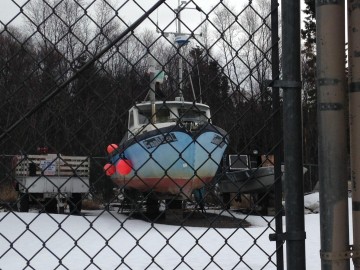 A Togiak man has pleaded guilty to fishing in a closed period and failing to register in the district. Kevin Harless, 53, a repeat offender, has been ordered to pay $25,000 for the violations. The F/V Good Deal still sits in the state trooper yard in Dillingham where it was impounded last summer. On July 2, Kevin Harless was caught salmon fishing nearly a nautical mile south of the Togiak River Section line, and he was not registered to fish in the Togiak District either. Law enforcement pounced, seized his vessel, and ended his season. Audio, Read the rest here 12:54
A Togiak man has pleaded guilty to fishing in a closed period and failing to register in the district. Kevin Harless, 53, a repeat offender, has been ordered to pay $25,000 for the violations. The F/V Good Deal still sits in the state trooper yard in Dillingham where it was impounded last summer. On July 2, Kevin Harless was caught salmon fishing nearly a nautical mile south of the Togiak River Section line, and he was not registered to fish in the Togiak District either. Law enforcement pounced, seized his vessel, and ended his season. Audio, Read the rest here 12:54
As fish farming grows, so does pollution from farming crops for fish feed, study suggests
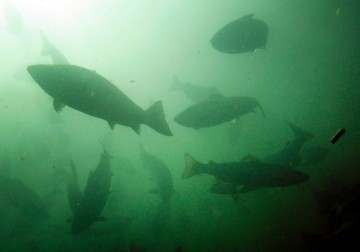 In an effort to make fish farming more sustainable, the aquaculture industry has been cutting back on feed made of other fish and replacing it with plant-based alternatives. But a new study warns that may make the fish less healthy to eat and have negative impacts on the environment. Many fish species that are farmed, including Atlantic salmon, the most farmed fish in Canada, are carnivores that eat feed traditionally based on fish meal and fish oil. Environmental advocates such as Greenpeace have criticized the practice as unsustainable, as wild fish that could be used to feed people or maintain wild populations need to be caught in order to produce the fish food. Read the rest here 10:20
In an effort to make fish farming more sustainable, the aquaculture industry has been cutting back on feed made of other fish and replacing it with plant-based alternatives. But a new study warns that may make the fish less healthy to eat and have negative impacts on the environment. Many fish species that are farmed, including Atlantic salmon, the most farmed fish in Canada, are carnivores that eat feed traditionally based on fish meal and fish oil. Environmental advocates such as Greenpeace have criticized the practice as unsustainable, as wild fish that could be used to feed people or maintain wild populations need to be caught in order to produce the fish food. Read the rest here 10:20






